CLCIV 101 Midterm 1 UMich
1/95
There's no tags or description
Looks like no tags are added yet.
Name | Mastery | Learn | Test | Matching | Spaced |
|---|
No study sessions yet.
96 Terms
When is the Minoan period?`
3000 - 1450 BC
When is the Mycenaean period?
1600 - 1150 BC
When were the Dark Ages?
1150 - 700 BC
When was the Archaic period?
700 - 480 BC
When was the Classical period?
480 - 323 BC
When was the Hellenistic period?
323 - 30 BC
Henrich Schliemann
discovered Troy, Mycenae
Cnossus
discovered by Arthur Evans, large Minoan palace, many rooms, palace economy
Fresco from Akrotiri
Minoan
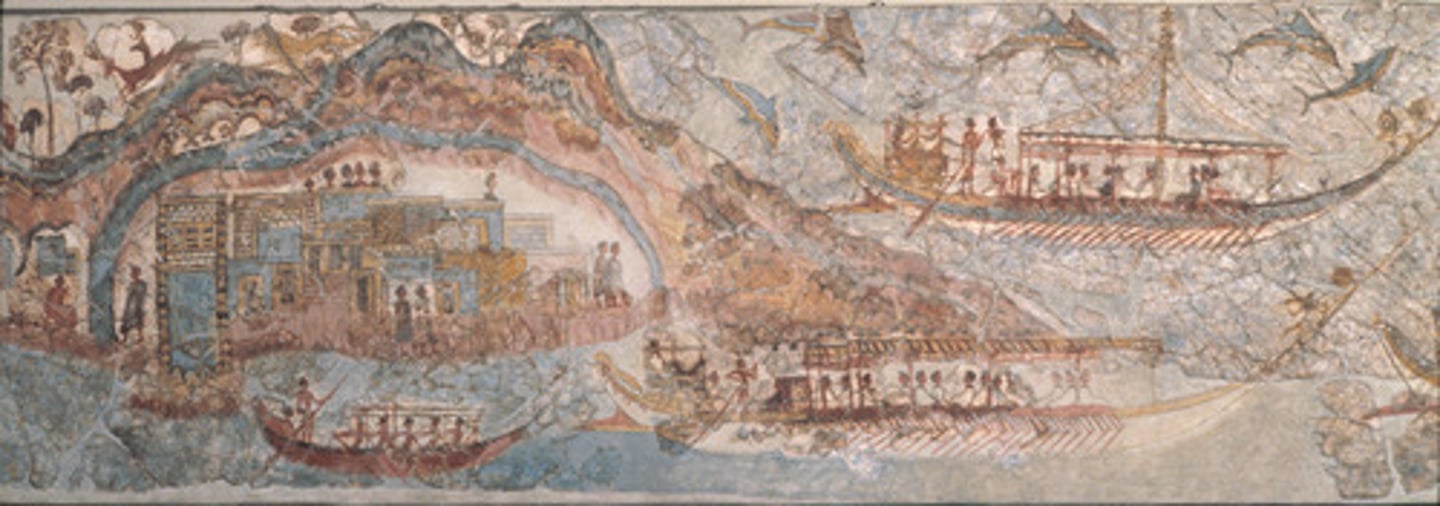
Snake Goddess
Minoans worshipped, symbol of fertility
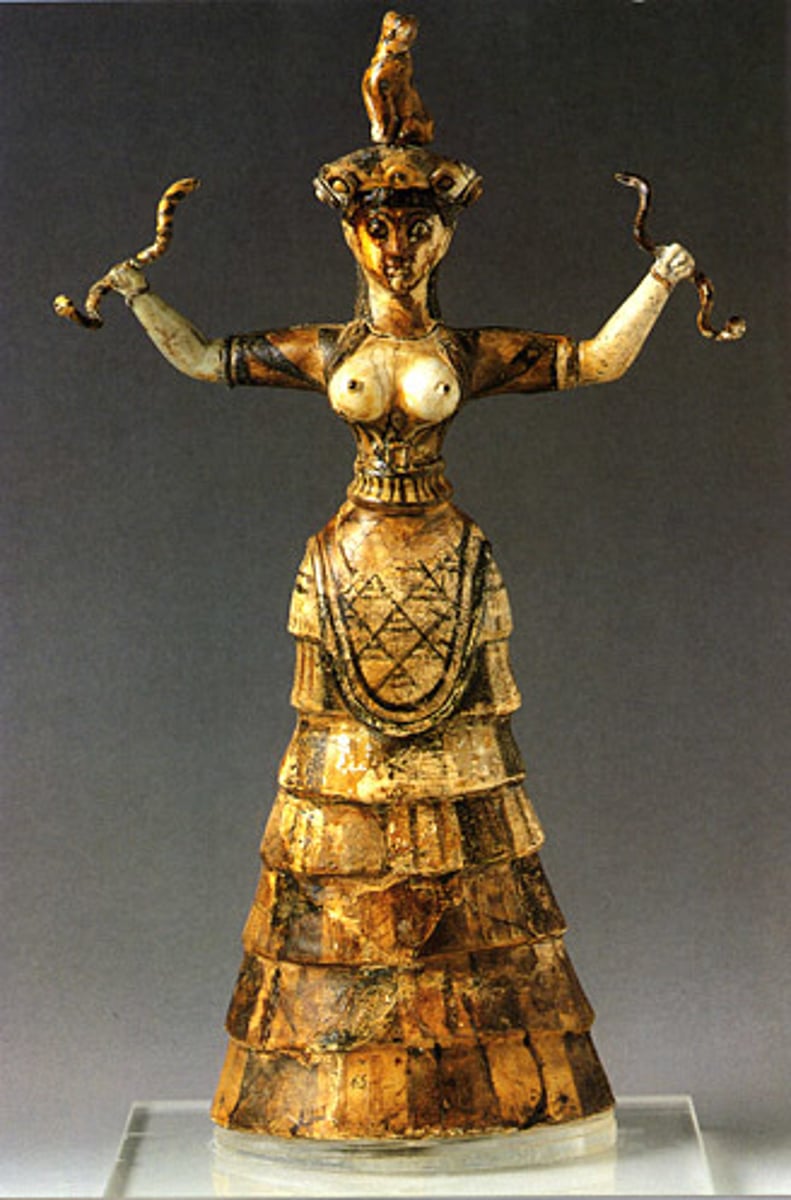
Bull Jumping Fresco
Mycenaean (horns of consecration, Cretan)
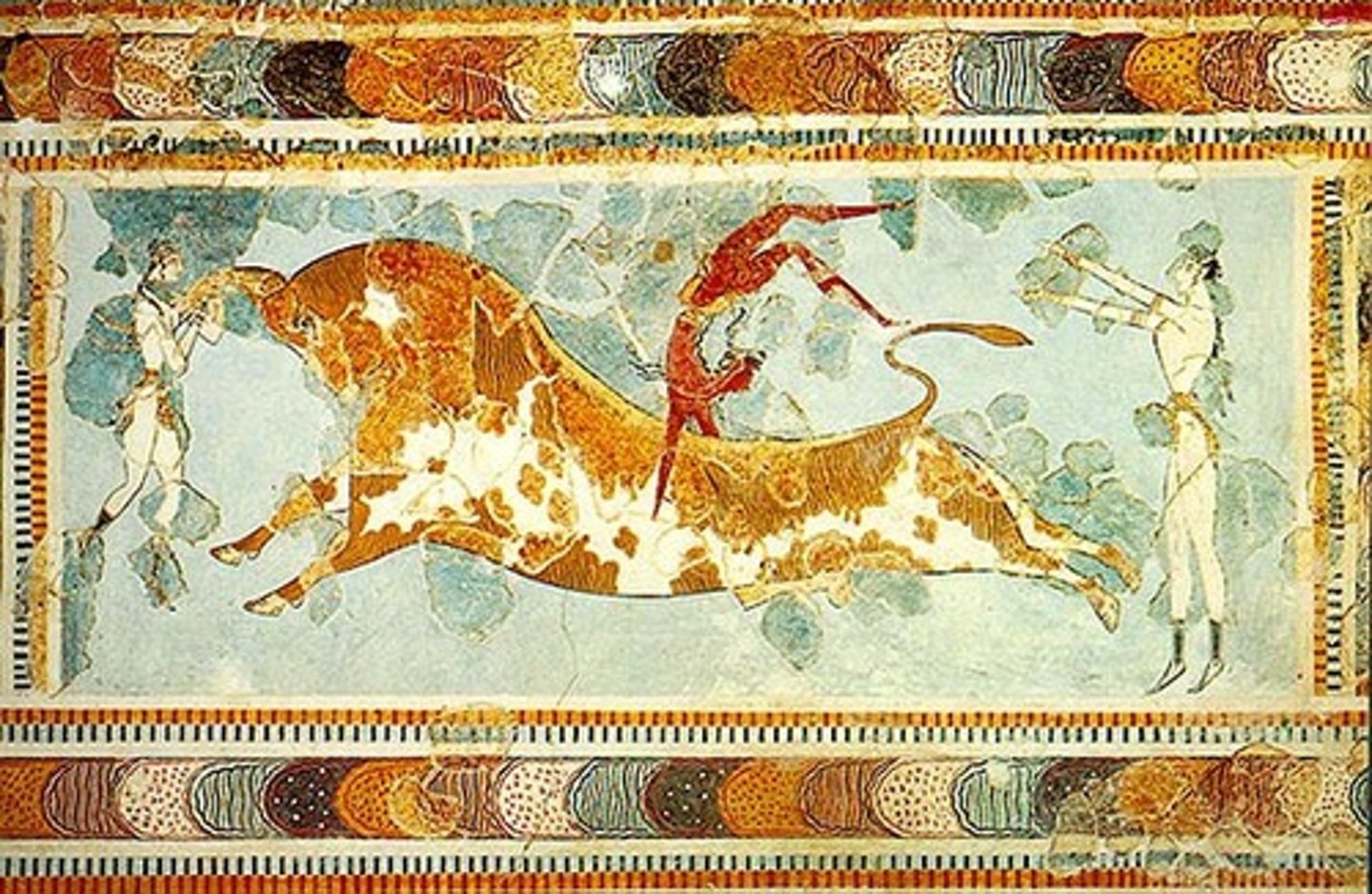
Seal with Goddess and Demons from Tiryns
Mycenaean
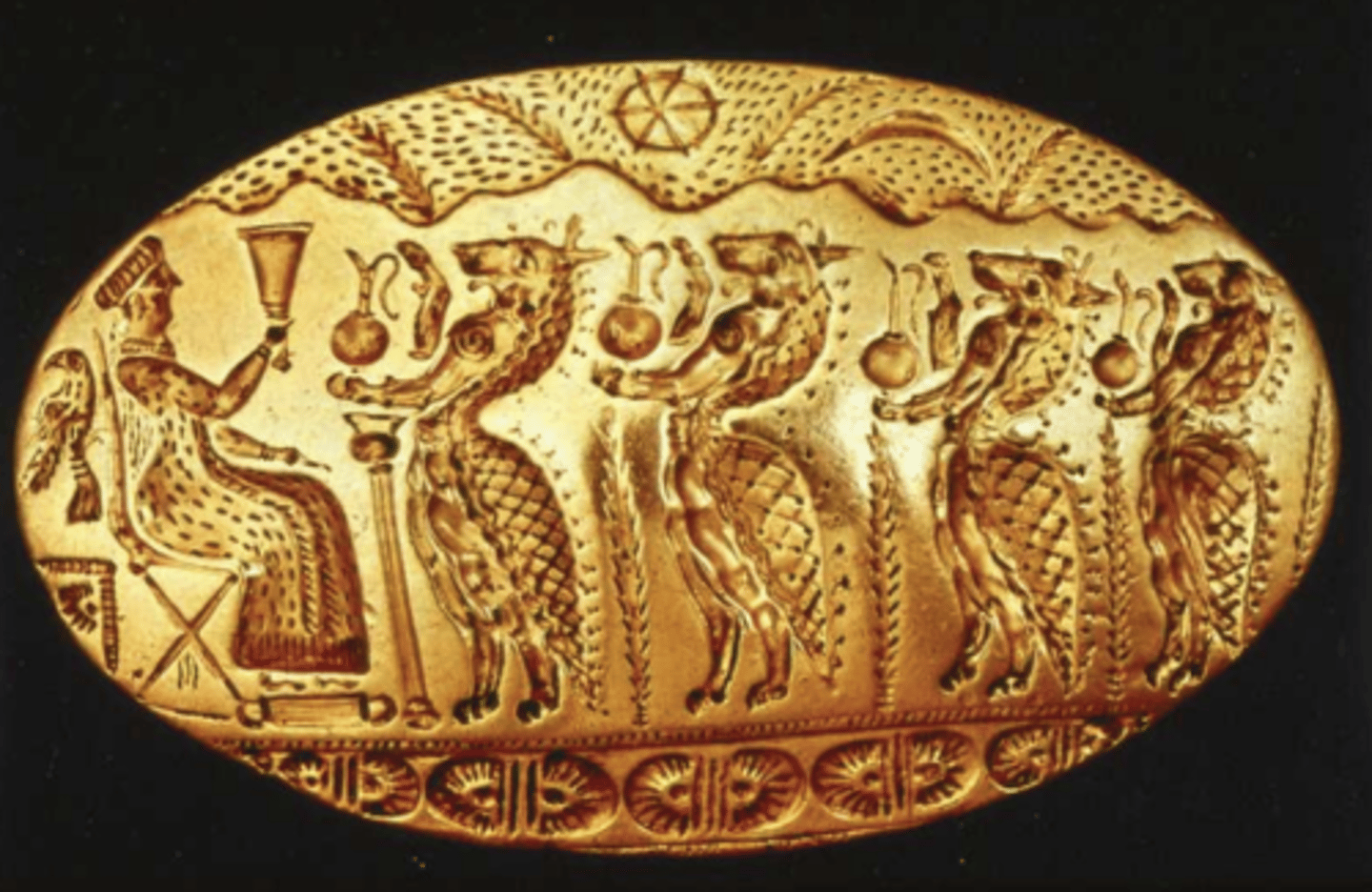
Goblet from Vaphio
Mycenaean
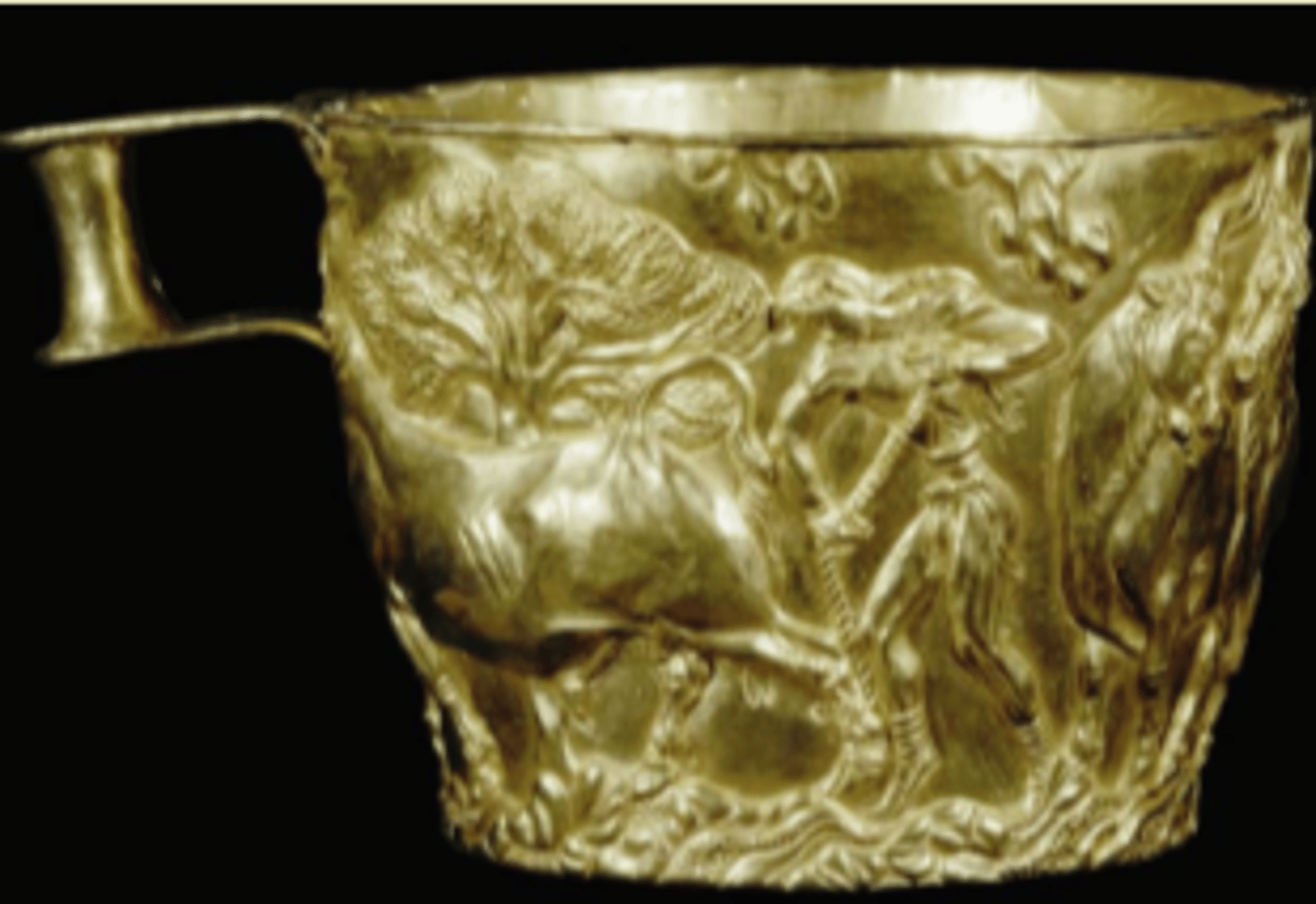
Dagger blade
Mycenaean

Linear A
Minoan, never deciphered
Linear B
Mycenaean, deciphered as Greek, mixed writing system, Pylos tablet
Dipylon Vase
8th century renaissance
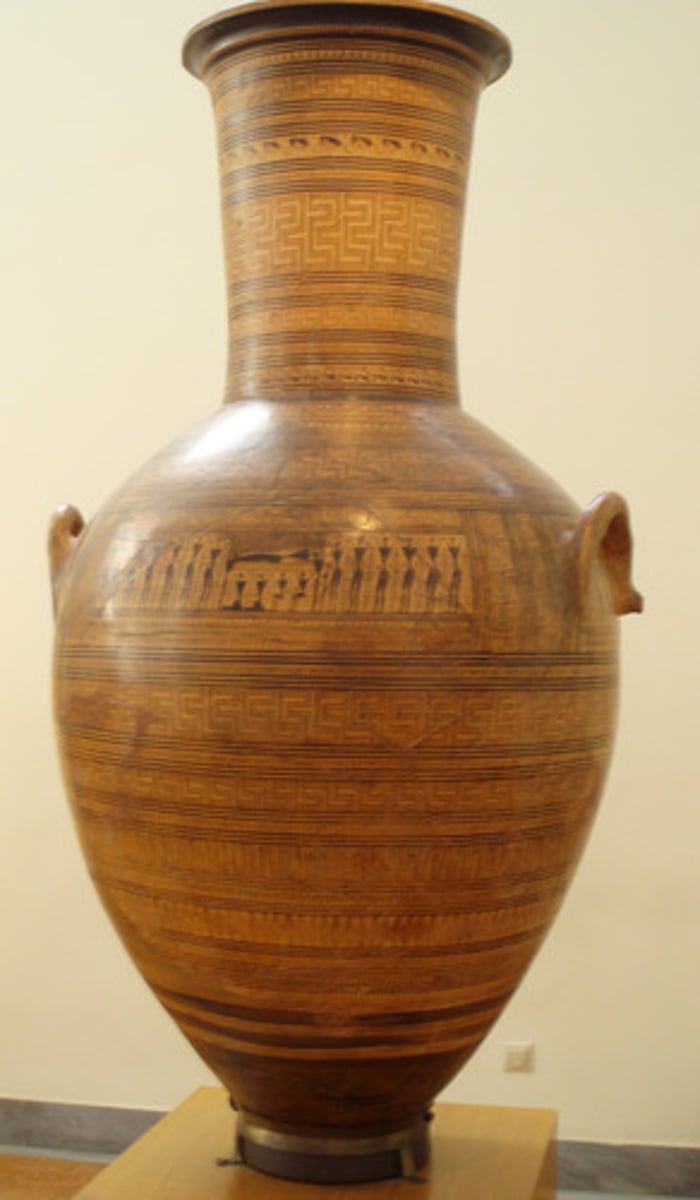
Cup of Nestor
8th century renaissance
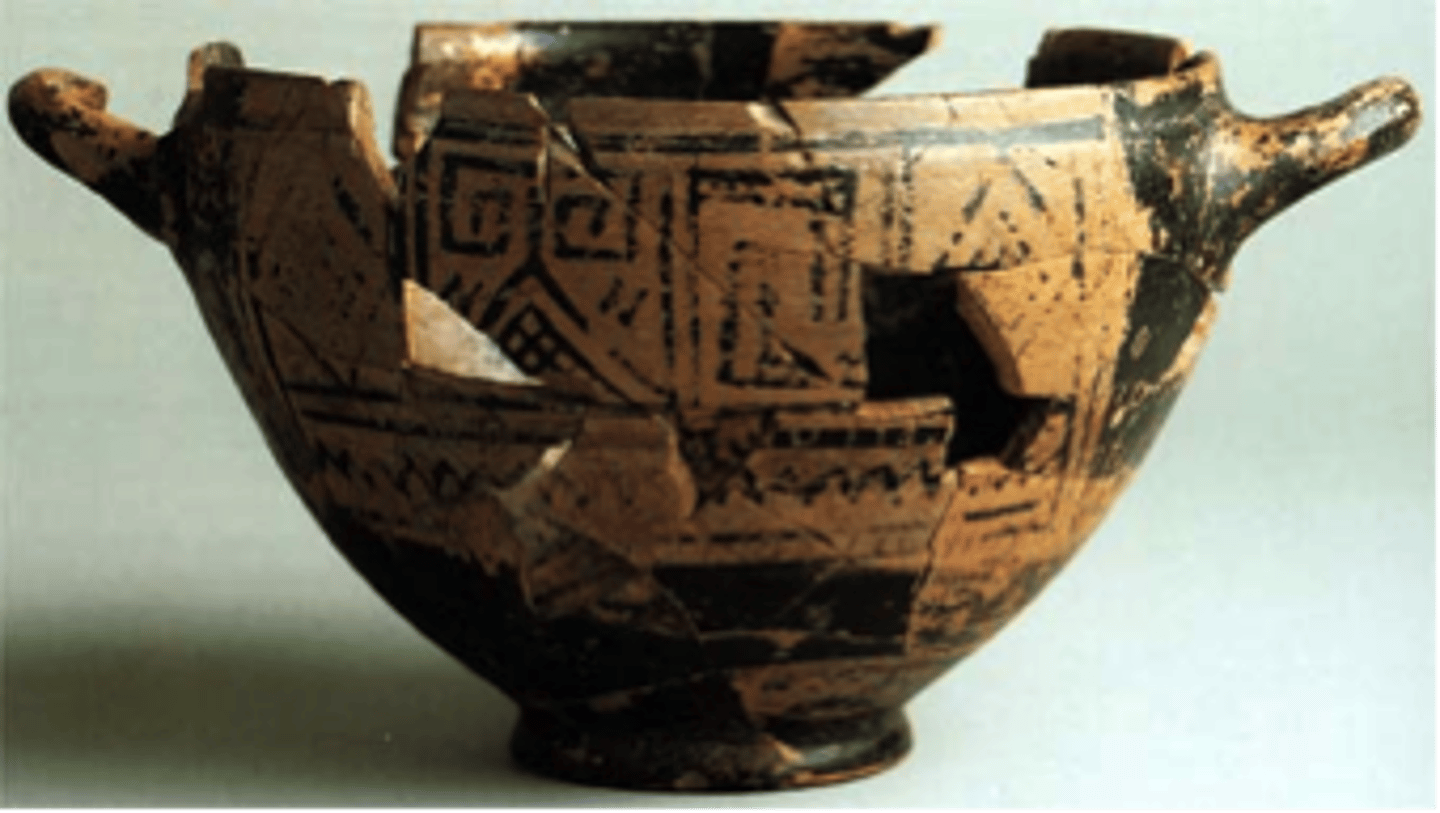
Exekias, Achilles and Ajax
Archaic period
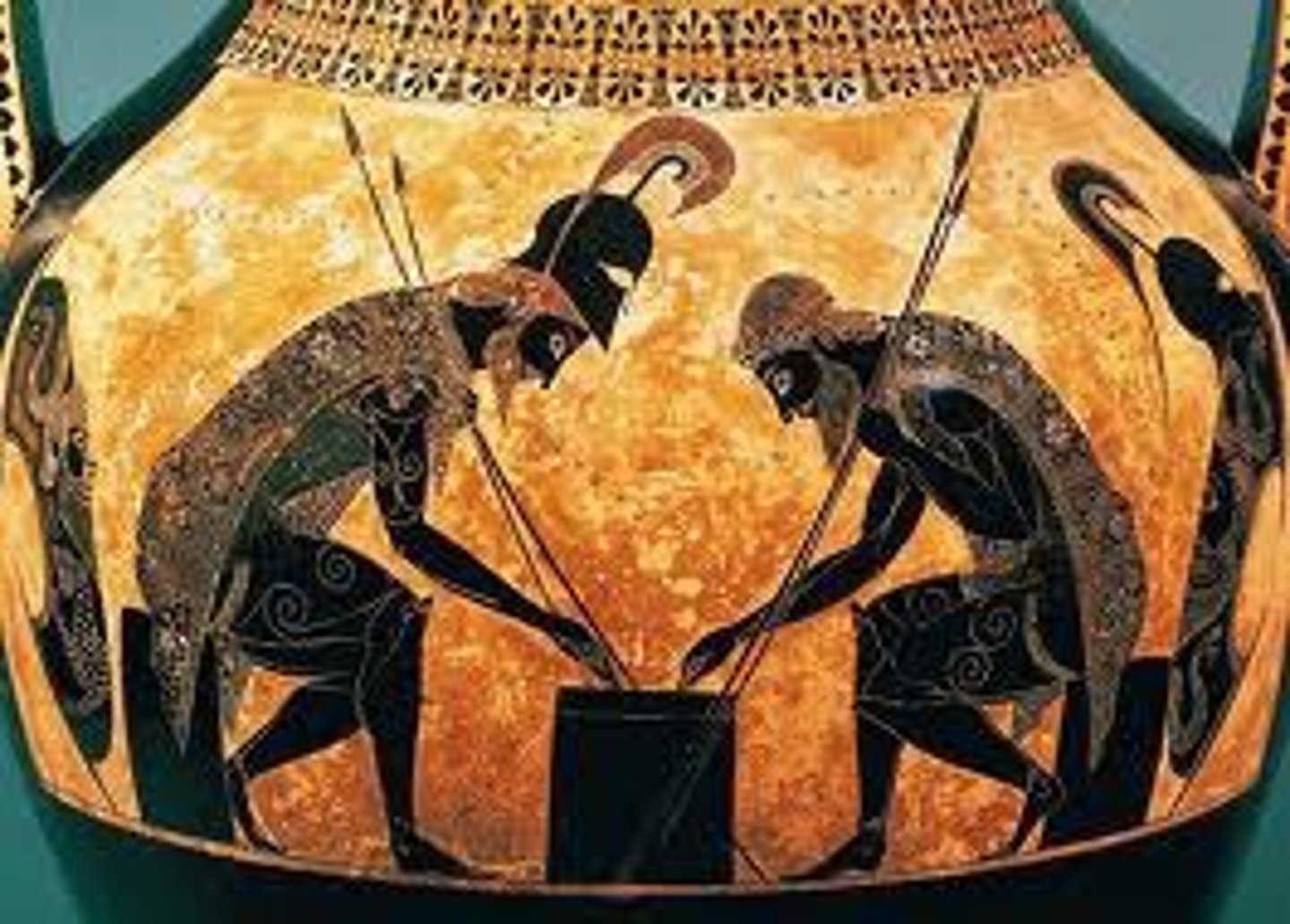
Mask of Agamemnon
Mycenaean period
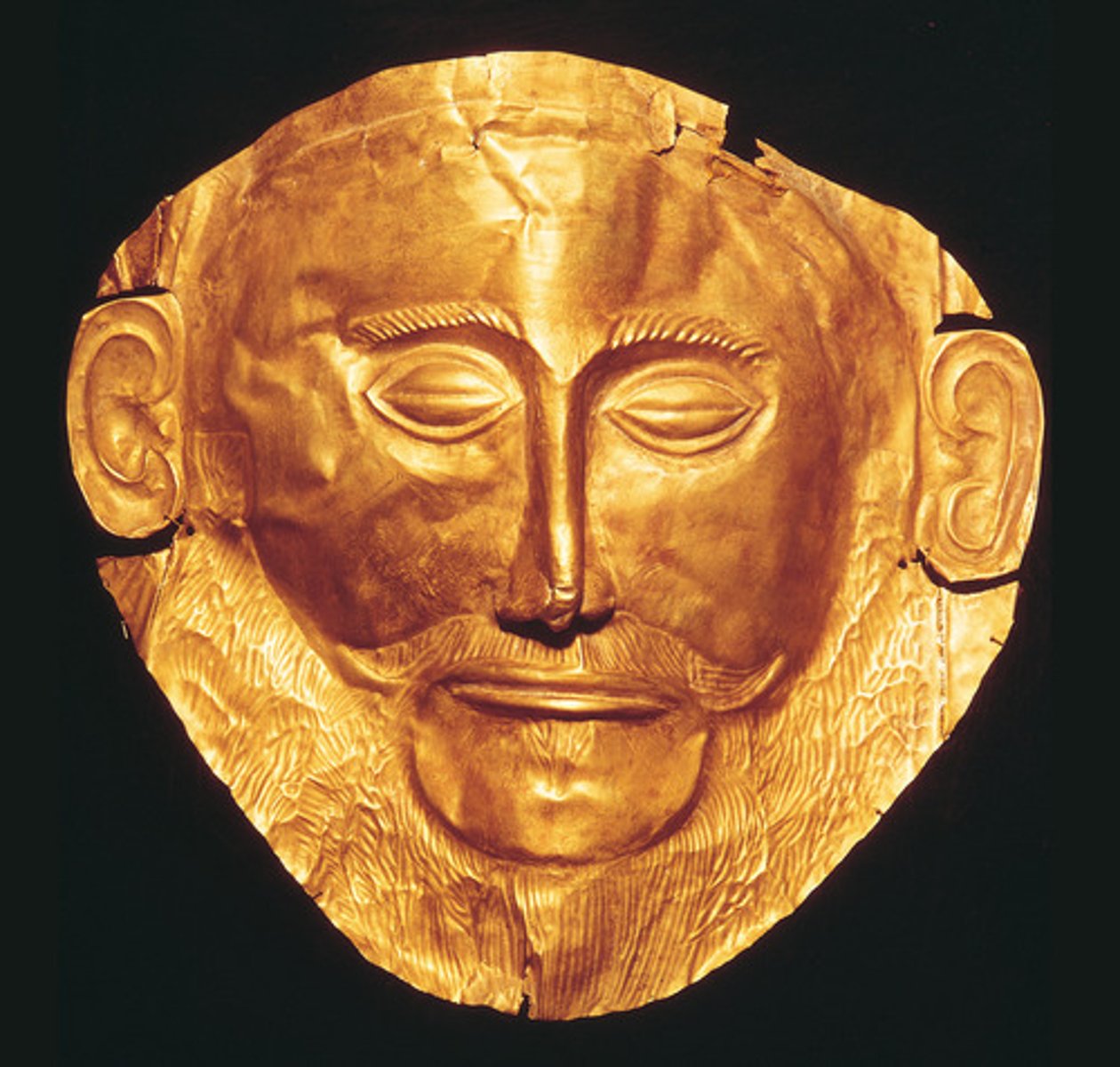
Tombs of Clymnestra
Mycenaean period
Boar hunt fresco
Mycenaean
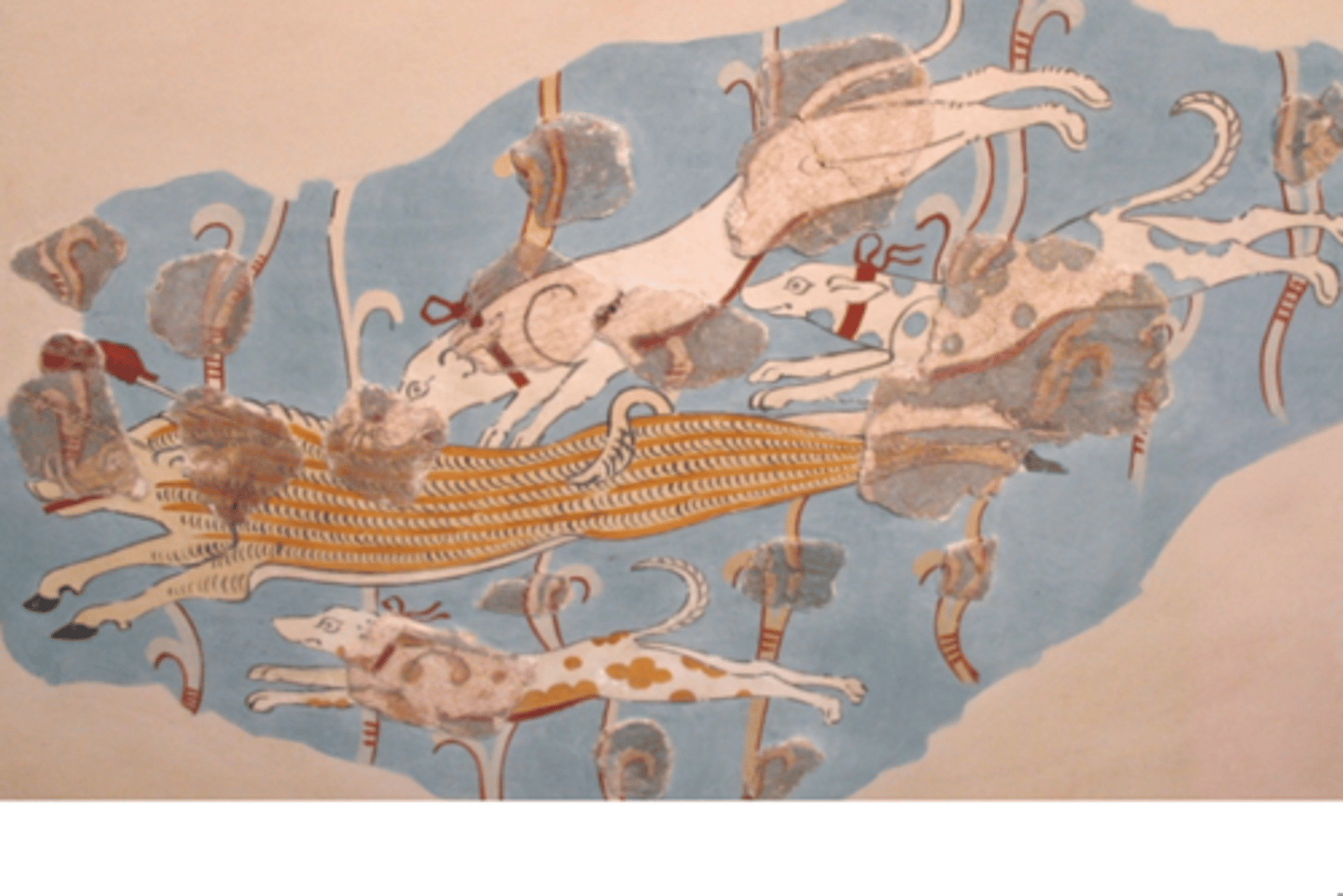
Syncretism
combination of different beliefs and practices
Hoplite equipment art
Archaic period
The Chigi Vase
Archaic period
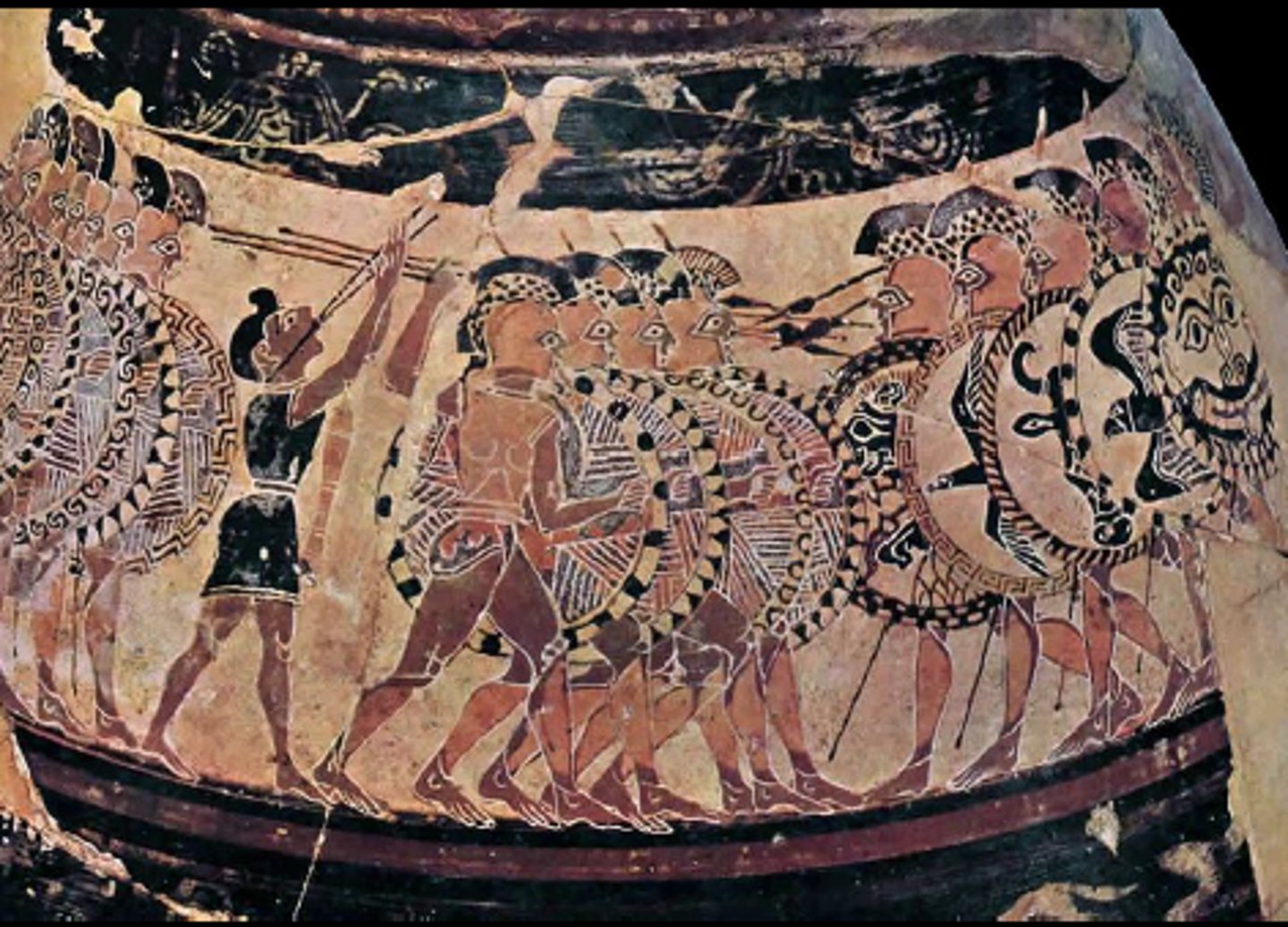
Mycenaean economy
agricultural economy
Early Dark Ages
no writing, no centralized economy, iron discovered
Late Dark Ages
revival, artistry returns (pottery), Greeks trade in the Mediterranean
Archaic Period classes
increasing class differences and between rich/poor
Hoplite Revolution cause
many more wars due to population increase
Hoplites
citizens who fight in the army, normally middle/lower class
Hoplite equipment
bronze helmet, spear, shield, short sword
Hoplite formation
phalanx, fosters community because very united
Greek Tyrants
power seized by an aristocrat and was supported by hoplites, tyrant supported the middle class
Pisistratus
coins, temple to Athena, founded Dionysia, sons Hippias and Hipparchus, established Homeric poetry at festivals
Agonistic Society (Archaic)
competition based, external recognition
Symposium
place to have intelligent discussions
Greece
hilly terrain, center of Mediterranean, lots of expansion
Mycenae
Citadel in Greece, independent kingdoms, Lion Gate and Tholos tombs
Conquest of Crete
Mycenaeans
Mycenaean societal structure
feudal/military society
End of Mycenaeans
possible invasion, possible natural disaster, possible system collapse
Greek literature is __
oral, performance based
Problems with the Iliad/Odyssey
repetitive language, entire lines used to express replies, lots of stock scenes
Oral Theory
Homeric poems survived by being passed down orally through oral recomposition
Oral poets
do not memorize poems, do not read, learn "formulas"
Excavation of Troy
lots of jewels/ceramics, Mask of Agamemnon, tombs at Mycenae
First Trojan writing
found in a Hittite script, mentions Achaeans
Chariots
function in Mycenaean society, used for elitism and warfare
Where did Greek language originate?
Indo European
Where did Minoans live?
Crete
Greek alphabet
related to Phoenician alphabet, used for commercial reasons
Key points of the Iliad
Agamemnon vs Achilles, embassy to Achilles, death of Patroclus by Hector, Achilles and Priam and Hector's funeral
Shame culture
seek to avoid shame, how are you seen by others, public esteem
Guilt culture
seek to avoid guilt, how do you feel about yourself, community is more important than the individual
Achilles
abides by heroic code, excessive qualities, forgets human limits
Gods' influence over human destiny
Gods cannot control fate
Solon to Croesus (Herodotus) in 594
unfortunate people get only evicted, fortunate people get a mix of good and evil
Gods in history
anthropomorphic, immortal, great powers
What did the gods not do?
create the universe, create humans, control destiny
Rules of god/human society
respect the dead, family, oaths, strangers
Xenia
hospitality
Greek religion
no sacred texts, no sense of sin, no inner faith, ritualistic
Sacrifices
gifts to gods to keep them happy (libations, food, animals)
Delphi
oracle of Apollo, religious center,
Basics of the Archaic period
rise of the polis, hoplites, colonization, tyranny
Synoecism
political unification around a city
Panhellenic games
Olympics, in honor of gods (esp. Zeus), truce over Greece
Greek cult of physical beauty
chasing physical beauty/perfection, art, stress on physical education
Archilochus
680 BC, died in battle, poems had violent and politics, shield excerpt
Who did Sparta conquer and why?
Laconia, Messenia, needed land
Spartiates
full citizens, small group with all the rights
Perioikoi
live in surrounding areas, free but second class, not full rights
Helots
conquered subjects/slaves, used as serfs, considered enemies because of the revolts
Lycurgus
Spartan, legendary lawgiver
Agoge
Spartan military education, state eugenics, military service for many years
Spartan women
pretty free b/c men at war, trained in some physical ed
Spartan government
kings, council of elders, ephors, assembly
Athenian government
oligarchy instead of kings, archons, aristocratic council
Three reformers
Draco: law code
Solon: archon, abolition of debt slavery, laws, new social classes, political roles based on property
Cleisthenes: democracy, broke up tribes
First Persian war
Ionian revolt, Darius against Greece, Battle of Marathon (Athens wins)
Second Persian war
Xerxes invades Greece, battle of Thermopylae, Battle of Salamis (Greeks win)
Where did the Persians live?
Ancient Mesopatamia
Persian leaders in order
Cyrus, Cambyses, Darius
Greeks vs Persians
hoplites vs archers, order vs disorder, rationalism vs emotionalism
Xerxes' failure
accused of yoking the Hellespont when trying to invade Greece
Aeschylus' Persians
Xerxes tries to invade Greece and fails, his mom feels a sense of foreboding, Darius' ghost reprimands Xerxes' hubris
Types of Greek drama
tragedy, comedy, satire
Origin of tragedy
Athens, evidence form Aristotle (Thespis), Aeschylus (adds actors, reduces chorus), Sophocles
Greek drama institution
City of Dionysia, tragic competitions,
Greek theater structure
orchestra, skene, chorus, entrances and exits
Interpretation of tragedy
should invoke pity/fear, focuses on irreconcilable concepts
Dionysus
god of wine, emotional freedom, theater
Dionysus' symbols
grape vine, leopard skin, cup, bulls, panthers, lions
Dionysus' double birth
Hera indirectly kills Semele, Hermes saves the fetus, Zeus sews the fetus to his thigh
Dionysus' followers
satyrs and maenads